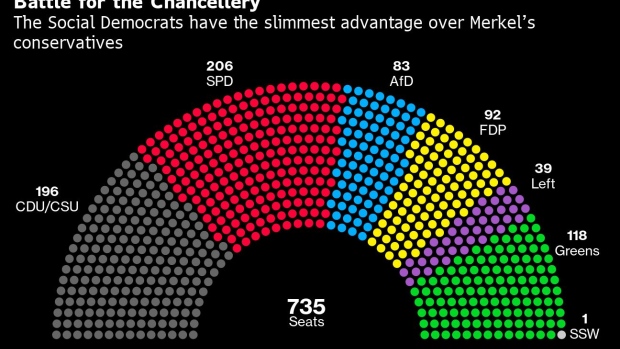Sep 27, 2021
Scholz Appeals to Greens, FDP to Form German Coalition Quickly
, Bloomberg News

(Bloomberg) -- Olaf Scholz of the center-left Social Democrats invoked the memory of past coalitions as he urged the Greens and the pro-business Free Democrats to join him in government as soon as possible.
Scholz reminded his potential partners of how their parties had helped take Germany forward during previous coalitions as he looked to seize the momentum after a narrow victory in Sunday’s election. He said he aims to take office before Christmas.
“It’s clear what the electorate wants -- an SPD government with the Greens and the FDP,” he told reporters at the SPD headquarters in Berlin. “That is what we want now.”
All the same, Scholz faces a tussle to close the deal with his main rival, Armin Laschet of Chancellor Angela Merkel’s conservative bloc insisting on Sunday night that he will also seek a deal with the Greens and the FDP to keep Scholz out.
Konstantin Kuhle, an FDP lawmaker, said Monday on ARD television’s breakfast show that although a coalition of CDU/CSU, Greens and FDP is “much more likely” than a few weeks ago, the SPD’s “strong result” had to be taken into account. Asked whether the FDP is set on running the finance ministry, he said it’s an “important point” for the party.
The SPD under Scholz beat Laschet’s Christian Democratic-led bloc by 25.7% to 24.1%, according to provisional results. In a fragmented parliament, either party will need a three-way coalition in order to govern, meaning the Greens and the FDP will hold considerable leverage as they begin negotiations.
Read More: Scholz Had a Plan to Win the German Vote. But He Needed a Crisis
FDP General Secretary Volker Wissing told ARD, the German public TV station, that his party and the Greens have broadly similar goals but different ideas on how to achieve them. Bilateral talks between the two are needed now to ensure that later negotiations on forming a three-way coalition can be a success, he said on Monday morning.
Standing near to a giant statue of Willy Brandt, the former Social Democrat chancellor, Scholz was greeted with sustained cheers and applause from supporters when he appeared at party headquarters Monday. He said that he’d slept well and was pleased overall with his party’s performance in the election.
After 16 years under Merkel’s pragmatic centrist leadership, the outcome of the vote will have wide-ranging implications for Europe and the West. Merkel will remain in office until a new government is in place, and if she stays through mid-December she will overtake Helmut Kohl as Germany’s long-serving postwar leader.
Anton Hofreiter, who heads the Greens’ parliamentary caucus, said that it had been a “catastrophic personal result” for Laschet, and a three-way tie-up of CDU/CSU, Greens and FDP was not more likely.
“In the end it’s about having a good coalition” that is able to tackle challenges like the climate crisis, Hofreiter said on ARD. The Greens and the FDP will meet initially in “small groups” to explore what they have in common, he added.
European stocks climbed Monday. Germany’s DAX Index outperformed as investors were relieved that the election result ruled out a hard-left coalition. Renewable shares gained thanks to the best-ever showing by the Greens.
“When a new government is eventually formed it is almost certain to involve the Greens, implying a greater focus on climate change policies,” said Steven Bell, chief economist at BMO GAM. “The feasible coalitions would involve compromise on all sides and imply no major policy shift.”
What Bloomberg Economics Says...
“Long and arduous negotiations lie ahead before a coalition government can emerge. That’s likely to mean an extended period of uncertainty for financial markets as well as economic and fiscal policy.”
-- Björn van Roye, Senior Global Economist. Click here for more coverage.
The Greens came in third on 14.8% -- their best-ever result, while the FDP got 11.5%. The Left slumped almost by half to 4.9% and support for the far-right Alternative for Germany fell to 10.3%.
A new government will need to address the issues Merkel left behind, including aging infrastructure and a lack of investment in digital technologies. The most pressing issue is weaning its auto industry and its energy system off fossil fuels without destabilizing the economy.
“We will fight in coming days to make sure that Olaf Scholz becomes chancellor,” SPD General Secretary Lars Klingbeil said on ARD. “The citizens want that.”
©2021 Bloomberg L.P.






